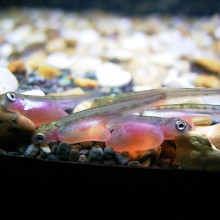Most fish live in either freshwater or saltwater, but some live in both. In this Question of the Week we find out how these fish manage to avoid becoming too salty or too watery. Also, we ask if you burn your food, do the calories go up in smoke, and if a second lightning strike can act as a defibrillator, re-starting your heart after the first bolt stopped it?!
In this episode

00:00 - Surviving in Salt- and Fresh-water?
Surviving in Salt- and Fresh-water?
Mark Briffa, University of Plymouth. Marine biologist with an interest in behavioural ecology:
Osmolarity describes the concentration of solutes in a solution. The problem that marine and freshwater fishes face are really two sides of the same coin. With freshwater fish there's a for salts to move out of the body leading to bloating and loss of salts. For marine fishes there's a tendency for water to move out of the body, leading to dehydration and excess salts. The most obvious trick to cope with these problems is to place a barrier between the insides of the body and the environment outside. The skin of the majority of fishes, both marine and freshwater, is relatively impermeable for water. Fish do need some permeable surfaces for respiration and water still moves between their tissues and the external environment. Freshwater fishes avoid water gain by not drinking and producing large amounts of urine. Marine fishes avoid water loss by drinking and producing small amounts of urine. In addition to these mechanisms fresh water fishes use their gills to absorb salts and marine water fishes use their gills to secrete salts. When salmon and eels migrate between freshwater and the sea there's a change in the cellular structure of their gills which enables their gills to start secreting salts just like a normal marine fish. All bony fish have to osmoregulate and since they first evolved in the sea it might appear that this would be easier for marine fishes but this is a bit of a red herring.
- Previous Splitting Atoms and Fires in Space
- Next The Secrets of Odysseus









Comments
Add a comment